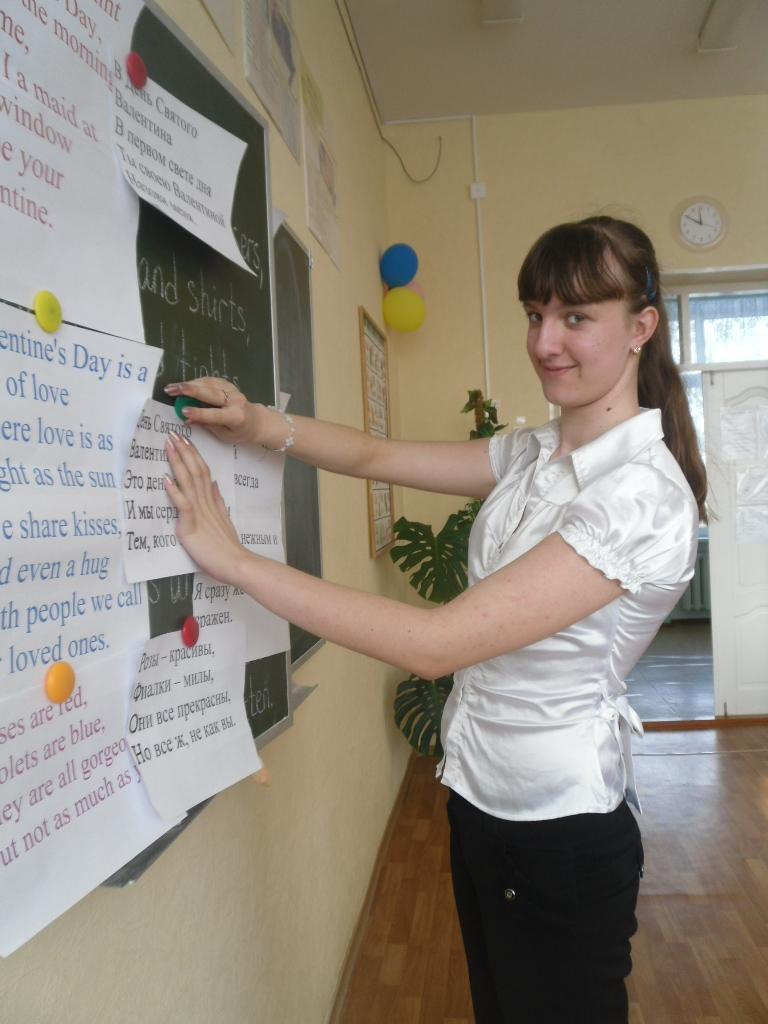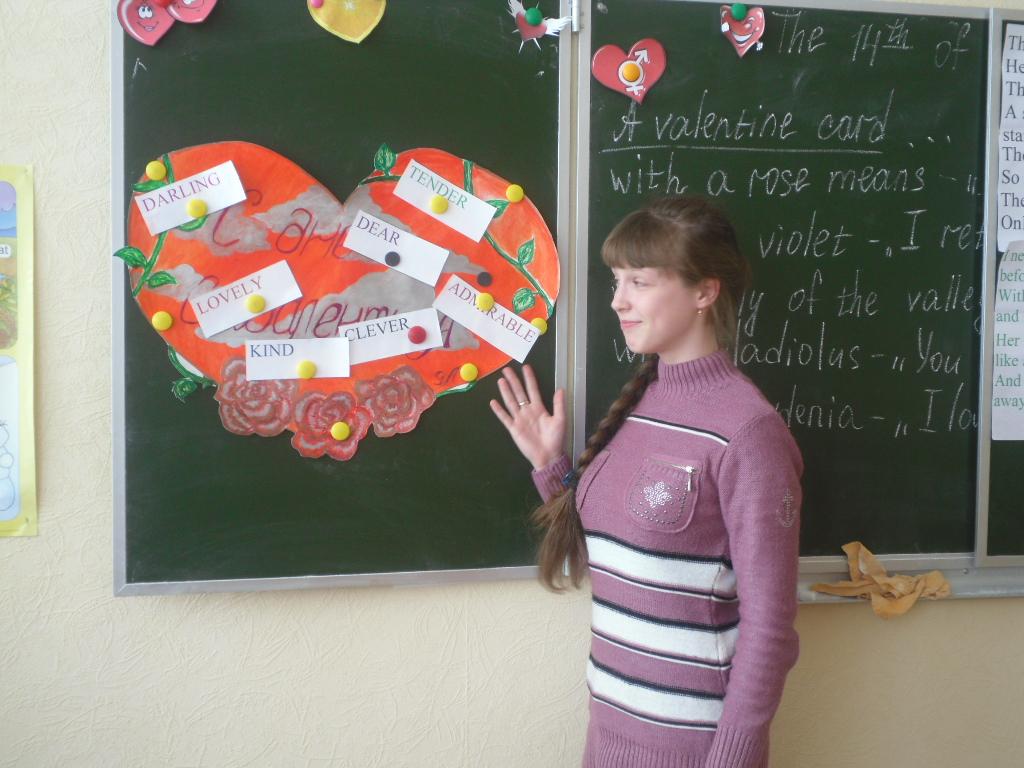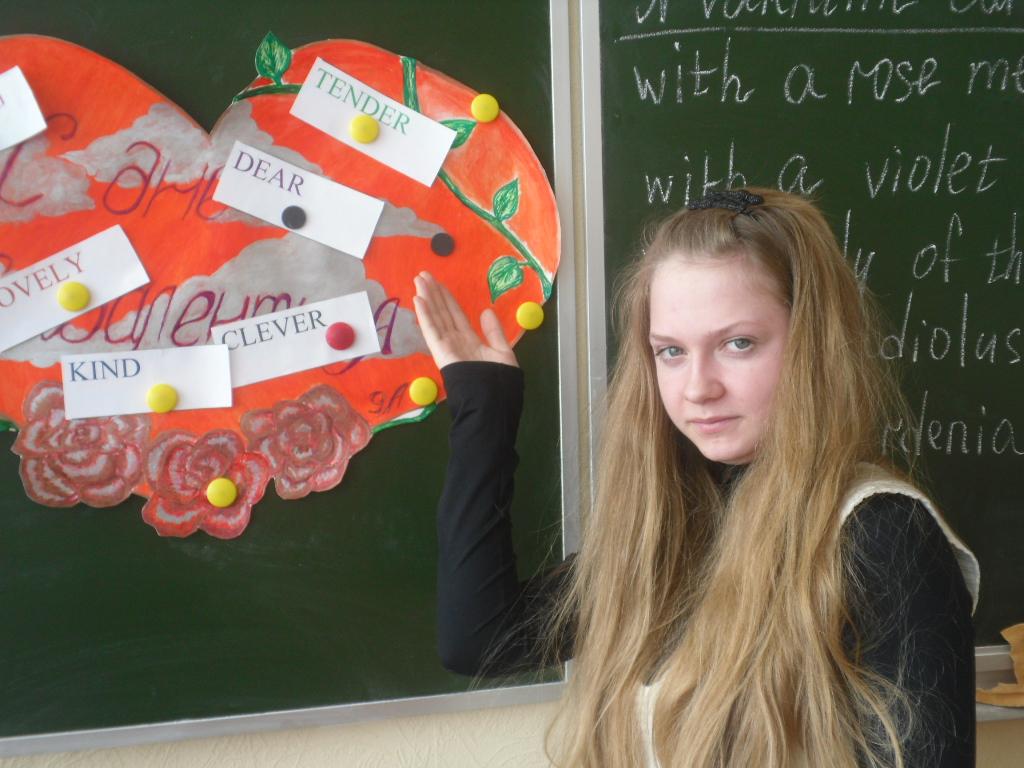День святого Валентина в стране изучаемого языка
Чайкина Надежда Васильевна - учитель английского языка
Tomorrow is Saint Valentine's Day,
All in the morning betime,
And I a maid at our window
To be your Valentine.
(Ophelia, "Hamlet", W Shakespeare).
Цель: повышение мотивации к изучению английского языка.
Задачи:
- совершенствовать социокультурную компетенцию старшеклассников;
- обогатить знания обучающихся о традициях, обычаях празднования Дня Св. Валентина в Великобритании;
- познакомить с различными легендами о происхождении данного праздника;
- развивать умения коллективного сотрудничества.
Оформление:
- на доске большая открытка – “Валентинка”;
- рисунки обучающихся, посвященные празднованию Дня Св. Валентина;
- пословицы и высказывания о любви;
- поздравления с днем Св. Валентина;
- стихотворения о любви.
Музыкальное оформление:
- песня “Only you” (by B. Ram & A. Rand) в оригинальном исполнении группы “The Platters”;
Ход урока:
Dear friends! You are welcome to our party dedicated to the Saint Valentine's Day which is held on the 14th of February.This holiday is popular all over the world, especially in Europe and America. On this day we send our Valentine – cards to our beloved and friends, present flowers and sweets.
I say, all flowers have their own meanings. Do you know them?
For example: a valentine card
with a rose means
with a violet –
with lily of the valley –
with Gladiolus –
with Gardenia –
“I love you passionately”
“I return your love”
“let make up”
“you pierce my heart”
“I love you in secret”
.Например: “валентинка”
с розой означает
с фиалкой –
с ландышем –
с гладиолусом –
с гарденией –
“я люблю тебя страстно”
“твоя любовь взаимна”
“давай дружить”
“ты пронзила мое сердце”
“я люблю тебя тайно”
This holiday was named after one Christian priest who helped the beloved. There are a great many legends concerning the origin of saint Valentine's Day. Let's listen to one of them.
St. Valentine’s Story
Let me introduce myself. My name is Valentine. I lived in Rome during the third century. That was long, long ago! At that time, Rome was ruled by an emperor named Claudius. I didn't like Emperor Claudius, and I wasn't the only one! A lot of people shared my feelings.
Claudius wanted to have a big army. He expected men to volunteer to join. Many men just did not want to fight in wars. They did not want to leave their wives and families. As you might have guessed, not many men signed up. This made Claudius furious. So what happened? He had a crazy idea. He thought that if men were not married, they would not mind joining the army. So Claudius decided not to allow any more marriages. Young people thought his new law was cruel. I thought it was preposterous! I certainly wasn't going to support that law!
Did I mention that I was a priest? One of my favourite activities was to marry couples. Even after Emperor Claudius passed his law, I kept on performing marriage ceremonies – secretly, of course. It was really quite exciting. Imagine a small candlelit room with only the bride and groom and myself. We would whisper the words of the ceremony, listening all the while for the steps of soldiers.
One night, we did hear footsteps. It was scary! Thank goodness the couple I was marrying escaped in time. I was caught and thrown in jail and told that my punishment was death. I tried to stay cheerful. And do you know what? Wonderful things happened. Many young people came to the jail to visit me. They threw flowers and notes up to my window. They wanted me to know that they, too, believed in love.
One of these young people was the daughter of the prison guard. Her father allowed her to visit me in the cell. Sometimes we would sit and talk for hours. She helped me to keep my spirits up. She agreed that I did the right thing by ignoring the Emperor and going ahead with the secret marriages. On the day I was to die, I left my friend a little note thanking her for her friendship and loyalty. I signed it, "Love from your Valentine."
I believe that note started the custom of exchanging love messages on Valentine's Day. It was written on the day I died, February 14, 269 A.D. Now, every year on this day, people remember. But most importantly, they think about love and friendship. And when they think of Emperor Claudius, they remember how he tried to stand in the way of love, and they laugh -because they know that love can't be beaten!
Would you like to listen to our poems about love?
Ученик 1:
Tomorrow is Saint Valentine's Day,
All in the morning betime,
And I a maid at our window
To be your Valentine.
(Ophelia, "Hamlet", W Shakespeare)
В День Святого Валентина
В первом свете дня
Ты своею Валентиной
Назови меня.
(Офелия, “Гамлет”, В. Шекспир)
Ученикк 2:
There is but one…
He took my heart,
There is but one…
A smile from the start
There is but one…
So strong and true
There is but one…
Only you.
(Anonymous)
Ты, только ты
Мое сердце забрал
Улыбкой одной,
Пришел и украл.
(Из переводов участников мероприятия)
Ученик 3:
I never was struck before that hour
With love so sudden and so sweet.
Her face it bloomed like a sweet flower
And stole my heart away complete.
(John Clare)
Любовью внезапной и сладкой
Я был навсегда поражен,
Лицом ее нежным и гладким
Я сразу же был сражен.
(Из переводов участников мероприятия)
Ученик 4:
Roses are red,
Violets are blue,
They are all gorgeous,
But not as much as you.
(Anonymous)
Розы – красивы,
Фиалки – милы,
Они все прекрасны,
Но все ж, не как вы.
(Из переводов участников мероприятия)
Ученик 5:
Valentine's Day is a day of love
Where love is as bright as the sun
We share kisses, and even a hug
With people we call our loved ones.
(Anonymous)
День Святого Валентина
Это день любви,
И мы сердечки дарим
Тем, кого любим мы.
(Из переводов участников мероприятия)
And now, let's recall all proverbs and sayings about this wonderful feeling – love.
English proverbs and sayings about love
1. Love is friendship set to music.
(E. Joseph Cossman)
Любовь – это дружба, переложенная на музыку.
(Е. Джозеф Коссман)
2. Like the measles, love is most dangerous when it comes late in life. (G. Byron)
Любовь как и корь, наиболее опасна в зрелом возрасте. (Г. Байрон)
3. Love is life, if you miss love, you miss life. (Leo Buscaglia)
Любовь – это жизнь, если ты теряешь любовь, ты теряешь жизнь. (Лео Бускалья)
4. Love is that condition in which the happiness of another person is essential to your own. (Robert A. Heinlein)
Любовь – это такое состояние, в котором счастье другого человека важнее своего собственного.
(Роберт А. Хейнлейн)
5. Life is the flower for which love is the honey. (Victor Hugo)
Жизнь – это цветок, для которого любовь – мед.
(Виктор Гюго)
6. Where there is love there is life.
(Mahatma Gandhi)
Где есть любовь, там есть жизнь.
(Махатма Ганди)
7. It is not only necessary to love, it is necessary to say so. (French proverb)
Нужно не только любить, но и говорить об этом вслух. (Французская пословица)
8. All's fair in love and war.
В любви и на войне все средства хороши.
9. Vows made in storms are forgotten in calms.
Клятвы, данные в штормовую погоду, забываются в тихую.
And now – a small contest. Who knows more affectionate words, concerning love?
Переводчик 1: А теперь небольшое соревнование. Кто знает больше слов – обращений к любимой (любимому)?
English greetings
1. Just a little note to say,
“Have a happy Valentine's Day!”
6. It's such a treat to know.
Someone so sweet!
2. A friend like you…
Is a dream come true!
7. It's high time
We were Valentines!
3. Just wanted to say…
Have a bright, delightful Valentine's Day!
8. Sending a basket of Valentine wishes.
Filled with lots of love and kisses.
4. Happieness is having you
For my Valentine.
9. Sending a wish with lots of heart.
For a day that’s happy from the start!
5. You'd make the nicest Valentine
That there could ever be!
And so I'm asking,
“Pretty, please, be Valentine's with me!”
Dear friends! At the end of our party let's listen to a well – known song “Only you” (by B. Ram and A. Rand). It is sung by the American vocal quintet “The Platters”. In Russian variant it will be sung by Edita Pyekha.
Источники:
- Cайт "Википедия" (http://ru.wikipedia.org/wiki/).
- газета “1 Сентября” (приложение “Английский язык”, №3, 2006 г., стр. 16; №3, 2008 г., стр. 10).



















